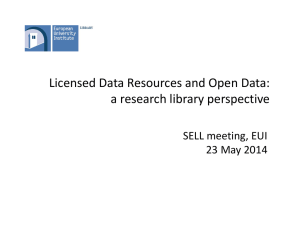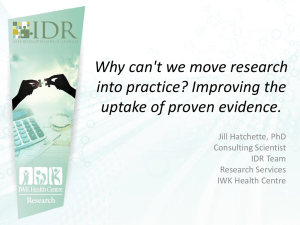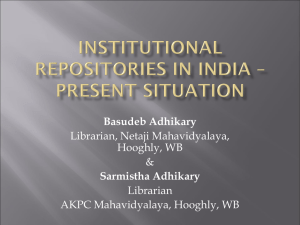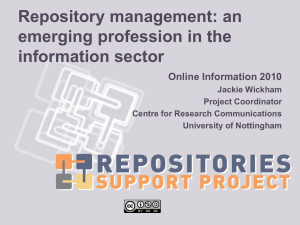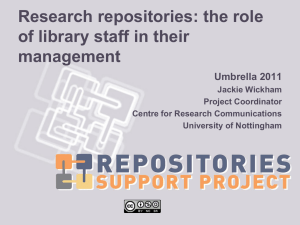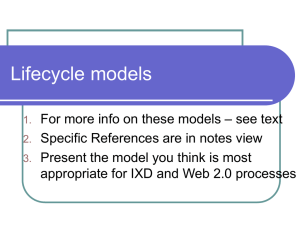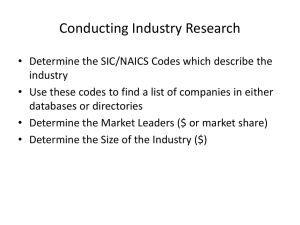pptx - University of Alberta
advertisement
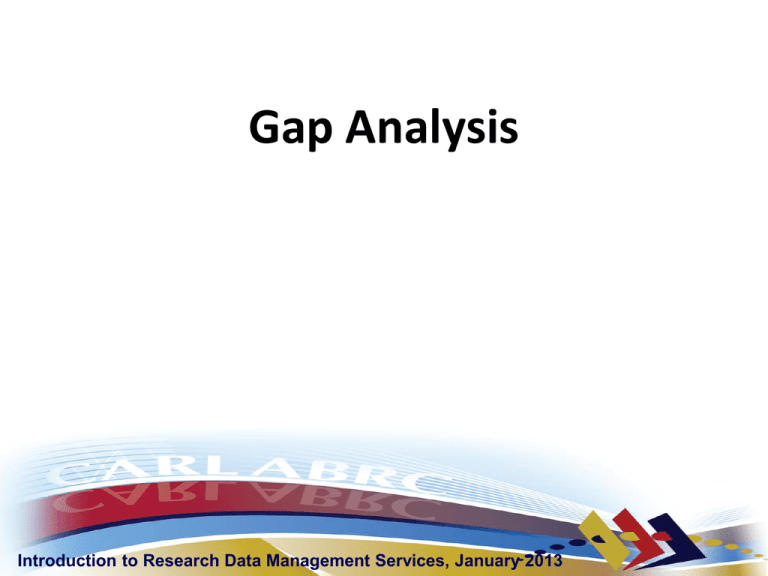
Gap Analysis Introduction to Research Data Management Services, January 2013 Gap Analysis • Original undertaken in 2008 and updated in 2011 • Research Data Strategy Working Group (now called “Research Data Canada”) • Examined the gaps between ideal state and current state across several indicators. Introduction to Research Data Management Services, January 2013 Basic Research Data Lifecycle Introduction to Research Data Management Services, January 2013 Policies Ideal State: Canadian organizations have coherent and cohesive policies that govern the management of data across disciplines. Data Production Data Dissemination Long-term Data Management Discovery and Re-purposing In limited cases Yes, but sometimes policies contradict each other In limited cases In limited cases e.g. IPY, SSHRC (but not enforced), CIHR (for selected types of data), Some provincial and federal agencies *NOT THE UNIVERSITIES! e.g. IPY, funding agencies require that researchers retain and share data if requested by others. e.g International Polar Year (IPY) e.g. ethics and privacy policies vs. data sharing policies Introduction to Research Data Management Services, January 2013 Funding Ideal State: Together, the range of funding mechanism cover costs throughout the data lifecycle, including the preservation of research data. Data Production Data Dissemination Long-term Data Management Discovery and Re-purposing Yes In limited cases In limited cases In limited cases CIHR, NSERC, SSHRC, CFI and some other research funding sources all support data production CIHR, NSERC, SSHRC, CFI provide funding for disseminating data Federal government and universities provide funding for disciplinary data repositories in some fields Access services part of disciplinary repositories, but often fee-based services Introduction to Research Data Management Services, January 2013 Roles and Responsibilities Ideal state: Each stakeholder in the data lifecycle has a distinct set of responsibilities, and works together to pursue higher-level stewardship goals; and Canada has a national entity serving as a focal point to coordinate data management and stewardship activities across the country. Data Production Data Dissemination Long-term Data Management Discovery and Re-purposing Research teams (principle investigators) Research teams (data must be retained and shared for 5 years after completion of project) In some disciplines -government agencies, universities and research communities Very limited -Some government agencies, universities and research communities Introduction to Research Data Management Services, January 2013 Data Repositories Ideal State: Canada has a comprehensive network of trusted and interoperable data repositories. Data Production Data Disseminati on Long-term Data Management Discovery and Repurposing Short term repositories or management solutions to assist with data analysis Limited Limited Very limited e.g. Data NRC (CISTI), LAC, Liberation Scholars Portal, U Initiative (DLI) Alberta working on TDRs Discipline-based repositories have some preservation aspects Discipline based repositories Introduction to Research Data Management Services, January 2013 Standards Ideal state: There is widespread adherence to standards throughout the data lifecycle, including metadata standards. Data Production Data Dissemination Long-term Data Discovery and Management Re-purposing Varying levels of Variable- highly Variable- regular adherence to discipline use in large data standards dependent centres and ad hoc Discipline-based e.g. DDI in implementation standards social science, in other cases Introduction to Research Data Management Services, January 2013 XML is commonly used in social sciences Skills and Training Ideal state: There is widespread adherence to standards throughout the data lifecycle, including metadata standards. Data Production Data Dissemination Long-term Data Management Yes Limited Very limited- a few Very limited data sciences employed to e.E DLI Training support Program researchers e.g.CNC CODATA, workshops for researchers Introduction to Research Data Management Services, January 2013 Discovery and Re-purposing Rewards and Recognition Ideal state: Reward systems for researchers widely recognize contributions to research data management. Data Production Data Dissemination Long-term Data Management Discovery and Repurposing Built in incentives linked to the successful undertaking of the research project Some disincentives for data sharing at universities and funding agencies (data about human subjects) Very limited Very limited Some research project (IPY), funding agencies (CIHR) and journals require deposit of data into data repositories. Some informal recognition within discpline Introduction to Research Data Management Services, January 2013 Research and Development Ideal state: Canada has a coordinated approach to R&D activities in support of data stewardship needs. Data Production Data Dissemination Long-term Data Discovery and Management Re-purposing Significant research and development support in order to facilitate data use and analysis. Unknown Very limited Some research and development at Canadian institutions Introduction to Research Data Management Services, January 2013 Unknown Research and Development Ideal state: Canada has a coordinated approach to R&D activities in support of data stewardship needs. Data Production Data Dissemination Long-term Data Discovery and Management Re-purposing Significant research and development support in order to facilitate data use and analysis. Unknown Very limited Some research and development at Canadian institutions Introduction to Research Data Management Services, January 2013 Unknown Gap Analysis Gap level Preservation Access Research and development Rewards and recognintion systems Skills and training Standards [Trusted digital] data repositories Roles and responsibilities Funding Policies Introduction to Research Data Management Services, January 2013 3 Current Levels of Support Across the Research Data Lifecycle Project-based Production Dissemination Institution-based Long-Term Management Reuse and Repurposing Introduction to Research Data Management Services, January 2013
